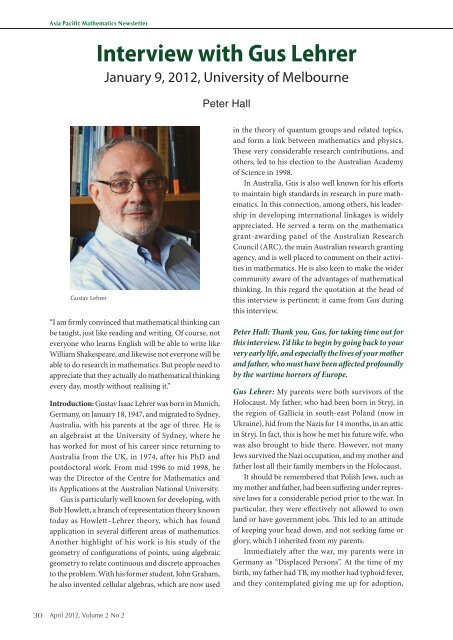Mathematics Newsletter
Mathematics Newsletter
Mathematics Newsletter
You also want an ePaper? Increase the reach of your titles
YUMPU automatically turns print PDFs into web optimized ePapers that Google loves.
30<br />
Asia Pacific <strong>Mathematics</strong> <strong>Newsletter</strong><br />
Gustav Lehrer<br />
Interview with Gus Lehrer<br />
January 9, 2012, University of Melbourne<br />
“I am firmly convinced that mathematical thinking can<br />
be taught, just like reading and writing. Of course, not<br />
everyone who learns English will be able to write like<br />
William Shakespeare, and likewise not everyone will be<br />
able to do research in mathematics. But people need to<br />
appreciate that they actually do mathematical thinking<br />
every day, mostly without realising it.”<br />
Introduction: Gustav Isaac Lehrer was born in Munich,<br />
Germany, on January 18, 1947, and migrated to Sydney,<br />
Australia, with his parents at the age of three. He is<br />
an algebraist at the University of Sydney, where he<br />
has worked for most of his career since returning to<br />
Australia from the UK, in 1974, after his PhD and<br />
postdoctoral work. From mid 1996 to mid 1998, he<br />
was the Director of the Centre for <strong>Mathematics</strong> and<br />
its Applications at the Australian National University.<br />
Gus is particularly well known for developing, with<br />
Bob Howlett, a branch of representation theory known<br />
today as Howlett–Lehrer theory, which has found<br />
application in several different areas of mathematics.<br />
Another highlight of his work is his study of the<br />
geometry of configurations of points, using algebraic<br />
geometry to relate continuous and discrete approaches<br />
to the problem. With his former student, John Graham,<br />
he also invented cellular algebras, which are now used<br />
April 2012, Volume 2 No 2<br />
Peter Hall<br />
in the theory of quantum groups and related topics,<br />
and form a link between mathematics and physics.<br />
These very considerable research contributions, and<br />
others, led to his election to the Australian Academy<br />
of Science in 1998.<br />
In Australia, Gus is also well known for his efforts<br />
to maintain high standards in research in pure mathematics.<br />
In this connection, among others, his leadership<br />
in developing international linkages is widely<br />
appreciated. He served a term on the mathematics<br />
grant-awarding panel of the Australian Research<br />
Council (ARC), the main Australian research granting<br />
agency, and is well placed to comment on their activities<br />
in mathematics. He is also keen to make the wider<br />
community aware of the advantages of mathematical<br />
thinking. In this regard the quotation at the head of<br />
this interview is pertinent; it came from Gus during<br />
this interview.<br />
Peter Hall: Thank you, Gus, for taking time out for<br />
this interview. I’d like to begin by going back to your<br />
very early life, and especially the lives of your mother<br />
and father, who must have been affected profoundly<br />
by the wartime horrors of Europe.<br />
Gus Lehrer: My parents were both survivors of the<br />
Holocaust. My father, who had been born in Stryj, in<br />
the region of Gallicia in south-east Poland (now in<br />
Ukraine), hid from the Nazis for 14 months, in an attic<br />
in Stryj. In fact, this is how he met his future wife, who<br />
was also brought to hide there. However, not many<br />
Jews survived the Nazi occupation, and my mother and<br />
father lost all their family members in the Holocaust.<br />
It should be remembered that Polish Jews, such as<br />
my mother and father, had been suffering under repressive<br />
laws for a considerable period prior to the war. In<br />
particular, they were effectively not allowed to own<br />
land or have government jobs. This led to an attitude<br />
of keeping your head down, and not seeking fame or<br />
glory, which I inherited from my parents.<br />
Immediately after the war, my parents were in<br />
Germany as “Displaced Persons”. At the time of my<br />
birth, my father had TB, my mother had typhoid fever,<br />
and they contemplated giving me up for adoption,


